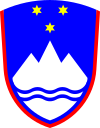
Back جمعية سلوفينيا الوطنية Arabic Asamblea Nacional d'Eslovenia AST Assemblea Nacional d'Eslovènia Catalan Státní shromáždění Republiky Slovinsko Czech Sloveniens Nationalforsamling Danish Nationalversammlung (Slowenien) German Asamblea Nacional de Eslovenia Spanish مجلس شورای ملی (اسلوونی) Persian Kansalliskokous (Slovenia) Finnish Assemblée nationale (Slovénie) French
National Assembly of the Republic of Slovenia Državni zbor Republike Slovenije | |
|---|---|
| 9th National Assembly | |
 | |
| Type | |
| Type | |
| Leadership | |
| Structure | |
| Seats | 90 |
 | |
Political groups | Government (53)[1]
Supported by (2)
Opposition (35)
|
| Elections | |
| Open list proportional representation with a 4% election threshold | |
First election | 8 and 12 April 1990 |
Last election | 24 April 2022 |
Next election | no later than 24 April 2026 |
| Meeting place | |
| National Assembly Building, Ljubliana | |
| Website | |
| https://www.dz-rs.si | |
 |
|---|
|
UN Member State |

The National Assembly (Slovene: Državni zbor Republike Slovenije, pronounced [dəɾˈʒàːwni ˈzbɔ́ɾ ɾɛˈpúːblikɛ slɔˈʋèːnijɛ][2] or [-ˈzbɔ̀ːɾ-][2]) is the general representative body of Slovenia. According to the Constitution of Slovenia and the Constitutional Court of Slovenia, it is the major part of the distinctively incompletely bicameral Slovenian Parliament, the legislative branch of the Republic of Slovenia.[3][4] It has 90 members, elected for a four-year term. 88 members are elected using the party-list proportional representation system and the remaining two, using the Borda count, by the Hungarian and Italian-speaking ethnic minorities, who have an absolute veto in matters concerning their ethnic groups.
As of May 2022, the 9th National Assembly of the Republic of Slovenia is in session.
- ^ "Slovenia's lawmakers approve ex-business executive as prime minister". reuters.com. Retrieved 25 May 2022.
- ^ a b "Slovenski pravopis 2001 - Inštitut za slovenski jezik Frana Ramovša ZRC SAZU in Slovenska akademija znanosti in umetnosti - izid poizvedbe". bos.zrc-sazu.si.
- ^ "U-I-295/07-8" (in Slovenian). Constitutional Court of the Republic of Slovenia. 22 October 2008. Retrieved 16 December 2010.
- ^ Lakota, Igor (2006). Sistem nepopolne dvodomnosti v slovenskem parlamentu (diplomska naloga) [The System of Incomplete Bicameralism in the Slovenian Parliament (diploma thesis)] (PDF) (in Slovenian). Faculty of Social Sciences, University of Ljubljana. p. 62.
Opinions differ, however the majority of domestic experts agree that the National Council may be regarded as the upper house, but the bicameralism is distinctively incomplete.
Cite error: There are <ref group=lower-alpha> tags or {{efn}} templates on this page, but the references will not show without a {{reflist|group=lower-alpha}} template or {{notelist}} template (see the help page).
© MMXXIII Rich X Search. We shall prevail. All rights reserved. Rich X Search